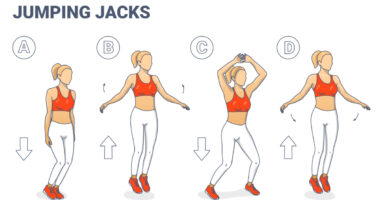
How to Protect the Teens You Love from Diet Culture BS – The physical changes that go down during adolescence can do a number on a person’s self-perception. So when you add the fact that teenagers are also steeped in diet culture—which dictates that thin bodies are better than fat ones and that food is something to be feared and controlled—their body image becomes all the more fragile. It’s no surprise, then, that it can be really, really difficult for teens to nourish themselves without guilt and feel comfortable in their own skin.
Just ask Virginia Sole-Smith, a journalist who writes the Burnt Toast newsletter and recently published Fat Talk: Parenting in the Age of Diet Culture. The New York Times bestseller shines a light on both the magnitude and the danger of anti-fatness in general, but more specifically, it’s a guide for adults who want to unlearn harmful beliefs in order to encourage more acceptance around food and bodies for the kids they love.
In other words, if you aren’t quite sure how to talk to the teenagers in your life—your own kids, your relatives, your students, perhaps—about this stuff, Sole-Smith has plenty of advice. Here are some of her best tips that can help the young people you care about (and yourself) feel less stressed about food:
1. Address your own “stuff” around food and bodies—and if you can’t overcome it, be honest about that.
“I grew up as a thin kid so there was never pressure put on me to diet, but I was really aware of the grownups in my life who were dieting,” Sole-Smith says. By restricting what you eat or talking about food in a diet-y way around a teen—like commenting that you were “bad” for eating a second cookie or declaring, “Oh I can’t eat that or I’ll gain weight!”—you’re sending the message that it’s important to control your food in order to control your body size, and that being fat is a very bad thing. (In reality, the link between food and weight is really complicated. So many things factor into our body size, including genetics, hormones, stress, environment, medication, physical activity, and others. So suggesting that you can control your body size by restricting what you eat is a massively oversimplified take.)
Ideally, every adult would feel at peace with food and their body. Of course, that’s not even close to realistic because we live in a culture that’s very critical of what we put in our mouths and how we look. If you think your eating might be disordered, here’s some advice for how to seek help so you can start to unpack why being a certain size feels so important to you.
You can also be honest about your food issues and anti-fat biases. “There are a lot of parents and people who are in a tricky space where, while they want to push back against diet culture and make things easier for their kids, they just can’t give themselves permission to let go of certain food rules and body ideals,” Sole-Smith says. “If you fall into that category, you can be straightforward with a teenager and say something like, this is NOT what I want for you. I’m stuck in this place because of how I grew up.” Until you tell them directly, they might not realize that you’re suffering and want better for them. By calling out your own struggles, you’re starting a conversation about how they have the chance to do things differently.
In a similar vein: If you have to change the way you eat for a medical reason, like managing diabetes or avoiding certain foods to prevent heartburn, for instance, be upfront and tell your young loved one why you’re adjusting your habits so that they don’t assume you’re doing it to lose weight. The intention matters because altering your eating for specific medical reasons can be an effective form of self-care, whereas restricting food in an effort to weigh less typically doesn’t work and can lead to disordered eating—and sends an anti-fat message.
2. Don’t shy away from explaining anti-fat bias to your kids.
If your goal is to help the teens in your life have a healthier, more peaceful relationship with food, you can’t avoid conversations about unrealistic appearance standards. And you certainly shouldn’t shy away from acknowledging the fact that fat folks are treated differently just because this reality makes you uncomfortable.
“At the core of diet culture and all the diet-y things we say about food is anti-fat bias,” Sole-Smith tells SELF. “Be really straightforward with your kids about what that term means, name it when you see it, and don’t be afraid to advocate against it.”
The Fat Liberation Self-Study Guide from Washington University in St. Louis defines anti-fat bias as “the stigmatizing belief that bodies should be thin and/or muscular to fit within commonly held standards of beauty, fitness, and health.” It goes on to explain that this mindset can lead to bullying, discriminatory hiring practices in the workplace, poorer relationship quality, health disparities, negative self-image, and harmful eating and exercise behaviors.
Like many forms of inequity, anti-fat bias can go unnoticed until you start learning more about it and explicitly calling it out. “If you’re not explaining to your kid that the joke grandma made at Thanksgiving was anti-fat, and if you’re not pausing TV shows to say, ‘That was an example of anti-fat bias,’ then you’re missing out on the opportunity to educate your kids about it,” Sole-Smith says.
“Fat Monica” on Friends is the classic example of a TV show dehumanizing a larger body and getting away with it, but examples aren’t limited to the early 2000s. And even toddlers are inundated with body-shaming messages, like the constant teasing about Daddy Pig’s “big belly” on Peppa Pig. You could also start pointing out how movies tend to villainize larger bodies by literally making fat characters the villains next to thin heroes: think Ursula and Ariel in The Little Mermaid, Jabba the Hut and Princess Leia in Star Wars, and the Dursleys in Harry Potter.
3. Stop commenting on bodies—yours included.
“A good starting point in helping your child have a better relationship with food and their body is to just stop talking negatively about bodies in general,” Sole-Smith says. “That goes for your own body, your child’s body, the bodies of people around you, and celebrities’ bodies.”
She shares that she had her own “aha moment” about this when her now-preteen daughter was two years old: “She repeated something negative that I had said about my body and I was pretty shaken by it.” Sole-Smith decided right then to make a conscious effort not to comment on how other people’s bodies look—that goes for both positive and negative remarks—and noticed how difficult it was. “It took a long time to stop, and I kept realizing, wow, I constantly want to comment on others’ bodies,” she says, adding that this type of judgment and shaming is so normalized in our culture we often don’t think twice about it.
Telling someone they look great after they’ve lost weight might seem like a compliment (and even something you’re expected to say), but it just reinforces the false idea that thinner bodies are better than fatter ones. Likewise, gossiping among friends about a celebrity’s apparent weight gain can feel like harmless chit-chat about someone you’ll never meet, but it can make everyone in the conversation feel more self-conscious about their own bodies and critical of others’.
Of course, pointing out anti-fat bias requires talking about bodies—but the intent in that case is to highlight that everyone, regardless of their size, deserves the same love, respect, and human rights.
4. Celebrate body diversity in your home.
As important as it is to model body neutrality yourself and have conversations about self-acceptance with the teens in your life, Sole-Smith says it’s equally crucial to showcase and celebrate diversity in your home.
For example: “Choose art that shows bodies of all different sizes. Read books and watch films that center fat protagonists,” Sole-Smith recommends. By choosing Hairspray for family movie night, say, and watching TV shows that showcase (or at least make an effort to showcase) body diversity among main characters, such as Shrill or Derry Girls, you’re showing your teenagers—without having to lecture them—that it’s possible to do the things you want no matter what you look like.
5. Help them find role models with different-sized bodies.
Although social media is a minefield of terrible diet advice and impossible body standards, there are some ways to use it for good. Sole-Smith recommends helping teenagers find role models with a diverse range of body sizes that they can look up to. “If your kid’s into rock climbing, send them a rock climber in a larger body to follow. If your niece or nephew is into dance, suggest some awesome fat dancers for their feed,” she says, like Dexter Mayfield and Lizzy Howell.
Rock climbing and dance are two of many activities that have a culture of thinness and narrow body standards, which can harm teens whether you realize it or not. It’s crucial to actively push against those harmful expectations in order to protect kids and change the harmful but common narrative that fat people can’t be happy and successful in these areas—and others—she says.
6. Talk about food in a neutral way, and keep a variety of options in the house.
Sole-Smith recommends keeping your language as neutral as possible at meal and snack times. “Don’t call certain foods ‘bad,’ don’t shame processed foods, and don’t tell your kid to limit certain foods,” she says. “Make sure they know that all foods are okay to eat as long as there’s not a medical reason to avoid them [like an allergy].” This might seem like a huge mindset shift depending on your own relationship with food and the messages you’re used to hearing, but even if health and nutrition are two things you care deeply about, talking about these things in a neutral way will help your teenager learn how different foods make them feel, without the side of guilt or shame that they might have if you discourage them from eating things like pizza and ice cream.
You can start by keeping a wide variety of options in the house and not policing what or how much your teenager eats. Make all foods available to them at all times, and trust that they’ll make decisions based on what tastes good to them and what their body needs, Sole-Smith recommends.
If you’re worried that this will lead to them eating a Doritos-and-candy-only diet, I can tell you from my own experience as an anti-diet registered dietitian that restriction tends to make people (of all ages) feel more out of control around food, not less, and there’s some research to back me up, as SELF previously reported. And I’d also encourage you to ask yourself if it’s really health you’re concerned about, or if you’re actually afraid your teen is going to gain weight because of your own anti-fat biases.
7. Check in with them about the food and body messages they’re getting at school.
If you learn that your teen’s bestie is attempting intermittent fasting or cutting out carbs in an attempt to lose weight, the answer isn’t to throw their pal under the bus or tell them not to befriend anyone who’s dieting. Instead, Sole-Smith suggests doing your best to listen to them without judgment, and to keep encouraging them to think critically about how diet talk affects them and their friends. This empowers them to make their own decisions about how they eat, and helps them build resilience to the food and body shaming that they’ll surely encounter throughout their life, she says.
Messages about food restriction at school don’t just come from peers. If a teenager comes home talking about a calorie-counting assignment or a health-class lesson loaded with diet talk and weight stigma, ask them how you can support them instead of going on the offensive right away: “Maybe they want your help emailing the teacher to explain why the lesson or the assignment is harmful, or maybe they just want to vent to you,” Sole-Smith says. You can also point out that what they’re learning isn’t in line with your own values—without telling them how to react or feel—she adds.
8. Enjoy all sorts of foods with them.
“Kids and teenagers will never give you the satisfaction of letting you know that what you say and do around them matters, but it does,” Sole-Smith says. If you want them to enjoy food without feeling stressed or guilty about it, show them how. “Enjoy all different kinds of meals with them, and let eating be a source of pleasure at home,” she adds.
When conducting interviews for Fat Talk, Sole-Smith spoke with a teenage girl who complained that she was surrounded by people talking about food in a negative way at school. “But she viewed home as a safe space, which was really powerful,” Sole-Smith recalls. “She knew she could come home, eat dinner with her parents, and be free from all that diet talk. For her, home was the soft place to land.”
Also read more from the website homepage










